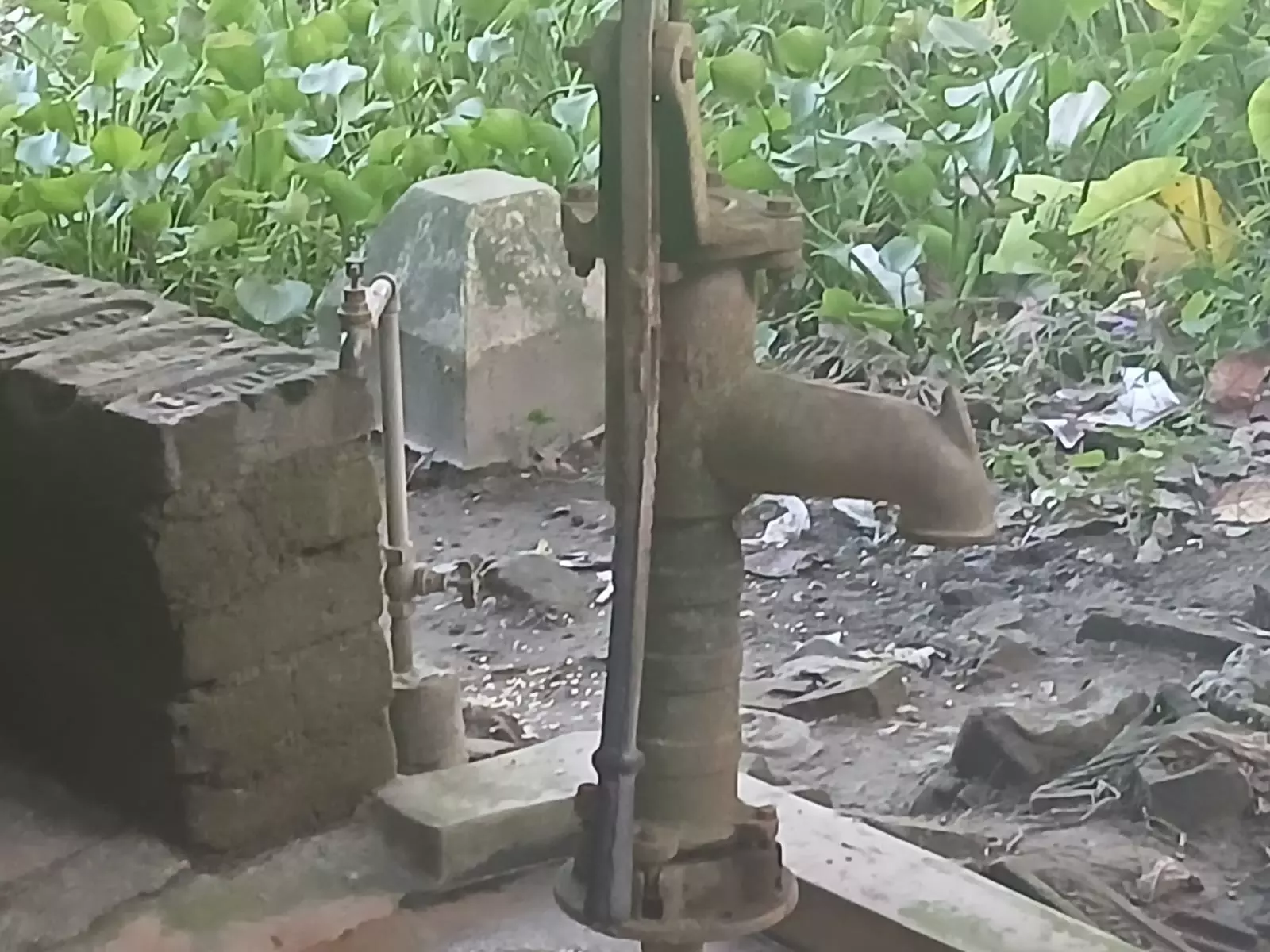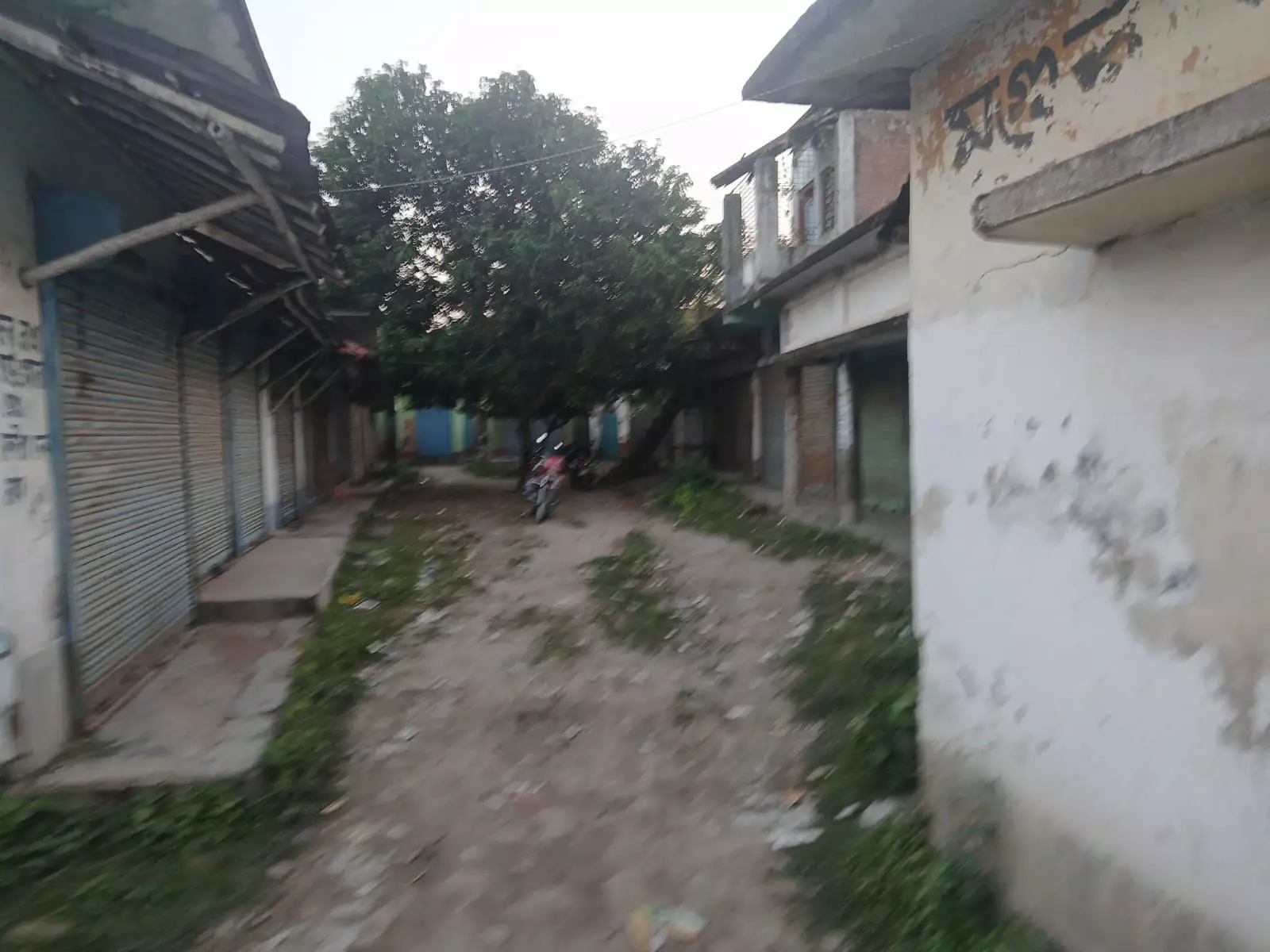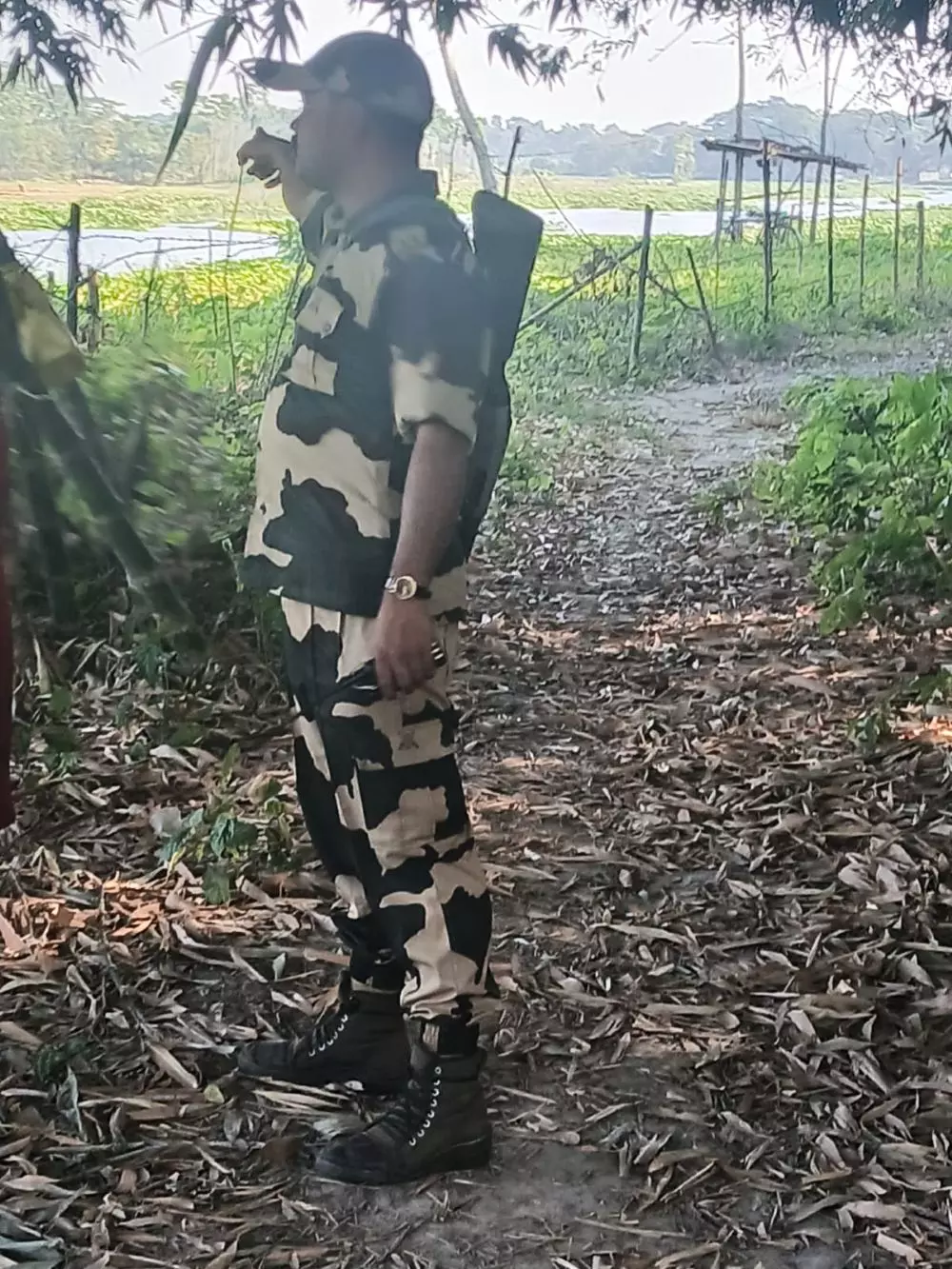
- Home
- India
- World
- Premium
- THE FEDERAL SPECIAL
- Analysis
- States
- Perspective
- Videos
- Sports
- Education
- Entertainment
- Elections
- Features
- Health
- Business
- Series
- In memoriam: Sheikh Mujibur Rahman
- Bishnoi's Men
- NEET TANGLE
- Economy Series
- Earth Day
- Kashmir’s Frozen Turbulence
- India@75
- The legend of Ramjanmabhoomi
- Liberalisation@30
- How to tame a dragon
- Celebrating biodiversity
- Farm Matters
- 50 days of solitude
- Bringing Migrants Home
- Budget 2020
- Jharkhand Votes
- The Federal Investigates
- The Federal Impact
- Vanishing Sand
- Gandhi @ 150
- Andhra Today
- Field report
- Operation Gulmarg
- Pandemic @1 Mn in India
- The Federal Year-End
- The Zero Year
- Science
- Brand studio
- Newsletter
- Elections 2024
- Events
Living on the Zero Line: Why life is a daily struggle for residents of Bengal's Hakimpur village
Hakimpur’s proximity to the border has earned it the moniker of 'shunno rekhar gram', or village on Zero Line. Here, everything — shopping, movement to and from the village, or routine activities like bathing in the river and going to school — are carried out under the watchful eye of the BSF.

At the far edge of the North 24 Parganas district in West Bengal is perched Hakimpur, a village so precariously balanced on the India-Bangladesh border that a wrong step in any direction could severely impact a resident’s fate.The Sonai river, which serves as the border here, cuts so sharply through the village that any fencing at the mandatory 150 yards from the Zero Line — the...
At the far edge of the North 24 Parganas district in West Bengal is perched Hakimpur, a village so precariously balanced on the India-Bangladesh border that a wrong step in any direction could severely impact a resident’s fate.
The Sonai river, which serves as the border here, cuts so sharply through the village that any fencing at the mandatory 150 yards from the Zero Line — the distance agreed upon by India and Bangladesh for any permanent defence structure along the border between the two countries — would end up slicing through fields, courtyards and likely even people’s homes.
This has been a persistent point of contention between the villagers and the authorities and has stalled the fencing of large stretches of the frontier, despite border pillars already being in place and the Union Home Ministry’s repeated attempts to complete the fencing of the Indo-Bangladesh border. The two countries share an approximately 4096.7 km border, of which about 2216.7 km is in West Bengal on the Indian side.
Among those who fear the likely impact of the border fencing on their homes is Jahangir Mandal, a fish trader and farmer. “I could lose my backyard; the barrier would come so close to my home that there would barely be any space left between my home and the fence,” he said, adding that putting up a fence 150 yards from the Zero Line could force him to relocate.

A portion of the wall of Jahangir Mandal's house adjacent to the border pillar which had been put up for fencing of the India-Bangladesh border. Photo: The Federal
Hakimpur’s proximity to the border has earned it the moniker of “shunno rekhar gram”, or the village on the Zero Line, which is the actual border between the two countries.
The nondescript frontier village hit national headlines this month, when hundreds of self-proclaimed Bangladeshi nationals turned themselves in at the border checkpoint here in a bid to return ‘home’, amidst the Election Commission of India’s (ECI) Special Intensive Revision (SIR) of electoral rolls in West Bengal.
The exercise is an attempt by the ECI to weed out alleged ineligible voters from the electoral rolls, but has drawn allegations of “benefitting” the interests of the ruling party at the Centre by deleting names of those unlikely to support them and triggered questions of identity and belonging. The commission had reportedly assured the Supreme Court during the SIR exercise in Bihar months earlier that those found ineligible for electoral roll registration under SIR would not lose citizenship.
The SIR exercise in Bengal started on November 4, and ever since, Hakimpur has emerged as a route for reverse migration, with “undocumented migrants” in the state fearing government action. So far, according to North 24 Parganas district police sources, around 1,500 people have been “pushed back” into Bangladesh through Hakimpur, the only border post witnessing any such surge in exodus.
One reason for this could be the porousness of the border in Hakimpur, the other its proximity to West Bengal’s capital city, Kolkata, which is likely to offer more job opportunities — one of the primary reasons for illegal migration. The attempts at reverse migration had peaked around the middle of November, before gradually subsiding.
The Federal spent the evening of November 8 at the Border Security Force (BSF) checkpoint here, but incidentally, no “illegal migrants” presented themselves at the post that day, requesting to be sent back to Bangladesh.
To those visiting Hakimpur, the village is likely to resemble any other rural settlement. Water bodies glisten under the sun, fishing nets dry on bamboo poles and fields stretch into the horizon. But, residents claim life for them is a continuous struggle, caught between issues of livelihood, security, legality and identity, shaped by the village’s proximity to the porous Indo-Bangladesh border, regarded by the authorities as a major smuggling route between the two countries.
“We live between two nations, yet somehow belong fully to neither. We are seen as a suspect even in our country,” Mandal reflected.
Also read: Why residents of former Bangladeshi enclaves are losing sleep over ongoing SIR in West Bengal
To enter or exit Hakimpur, visitors as well as residents must pass BSF checkpoints, often having to produce their voter identity cards or land registration papers as proof of stay; visitors need to have “permission slips” issued by the BSF.
A single Public Works Department (PWD) road leads to the village, passing through the outpost situated roughly two kilometers from the border inside Indian territory. According to estimates by the panchayat as well as BSF sources, about one-fourth of the village’s total area of 8.61 square kilometres lies beyond the outpost, towards the border. The village has a population of 11,241, according to panchayat records.
Every vehicle and pedestrian entering or leaving Hakimpur is stopped at the checkpoint for identity verification and inspection of the goods being carried, say villagers. Even essentials for everyday use cannot be brought in or out of the village without prior permission in the form of a pass issued by a competent authority, at least of the rank of a panchayat member, they add.
“It is winter, but even if I want to buy a shawl from outside [Hakimpur], I would need permission to bring it into the village,” said Mustafa Sardar, a resident and social worker, who is a member of one of the state’s leading human rights organisations, Banglar Manabadhikar Suraksha Mancha.
Local shops in and around the village operate under a special “license” issued by the BSF, but are purportedly not always fully stocked to meet the villagers’ needs, as the security force has imposed a weekly purchase limit on supplies for shops, claim both village residents and business owners.
“The Hakimpur market is over a hundred years old. It used to be a bustling place, but ever since the BSF check-post was established around a decade back, the market has been on a slow decline,” claimed local businessman Tapan Pal, gesturing toward rows of shuttered shops that have purportedly closed down.
Local traders estimate that at least 20 shops have closed down in the past five years.
“The market is now on the verge of complete closure, with only a handful of shops still operating. The weekly purchase limits are far from enough to sustain a business,” added Pal, who runs a stationery shop at the market.

A row of shuttered shops. Photo: The Federal
BSF public relations officer Subhendu Bharadwaj declined to comment on the matter, but officers on the ground offer a different perspective from that of the local community.
“For a village with a population of less than 15,000, 480 licenses have been issued. The weekly purchase limit [for each shop] is capped at Rs 5,000 for general shops and Rs 10,000 for medicine shops,” said an official of the BSF’s 143rd Battalion, which mans the Hakimpur outpost.
The officer, who requested anonymity as he is not authorised to speak to the media, argued that the limits are reasonable given the number of licensed shops. He also maintained that the cap is not enforced too strictly.
“Some restrictions are necessary. Otherwise, under the pretext of local demand, goods will inevitably be smuggled into Bangladesh,” he alleged.
The restrictions, Mustafa Sardar points out, curtail an individual’s freedom to conduct business and effectively stifles opportunities for trade expansion, which he argues is gradually driving shops to shut down.
Also read: Why the SIR's launch in Bengal on filmmaker Ritwik Ghatak's birth centenary is a profound irony
Villagers claim the cap on supplies forces greater dependence on purchase from outside, a move that frequently brings them into conflict with the BSF.
“The other day, the BSF seized an insulating tape that I was forced to buy from outside, as it was not available in the local shops. I needed it for domestic use. I was even hackled,” claimed Jahangir Mandal.
Over the years, villagers have alleged numerous incidents of mistreatment, some humiliating, some violent — a farmer ordered to chase smugglers and beaten when he refused; a woman allegedly humiliated under suspicion; Young men detained for walking near the river at dusk.
“I was returning from Bithari [a nearby village, some four kilometres away from Hakimpur] a couple of years back, when BSF personnel stopped me at the check post and began frisking me, accusing me of carrying contraband,” claimed Meena Mandal, a homemaker. “A lady jawan even assaulted me,” she further alleged. According to Meena, the incident continues to haunt her.
According to Bapi Sardar, a member of the Hakimpur Pachayat, such incidents are not rare and even school-going children are not spared, as every resident of the village is viewed through a lens of suspicion by the BSF.
Farmers bringing in produce from their fields, children carrying books to school, residents bringing in goods from nearby towns and even guests visiting relatives in the village, all have to undergo rigorous frisking, Sardar rued, alleging that after long hours on duty, the behaviour of the BSF personnel was not always amiable.
Many residents allege repeated harassment, including questioning, detention, or demands to prove that they are not helping smugglers slip across the river under the cover of night.
The relentless surveillance is taking a toll on the village’s social life, leading to children dropping out of school, families from outside hesitating to marry their daughters in the village etc, Sardar added.
“Who would want a daughter living in a place where she needs a guard’s permission just to attend a relative’s wedding?” asked Selim Dhabak, a doctor who has been providing basic healthcare to local residents for over 15 years and a resident of Hakimpur.
According to villagers, organising a wedding or any social event at the village was a painful experience since everything, from the guest list to party supplies, must be approved and brought in with permission from the BSF.

A BSF officer points towards the Shonai River which acts as the border here and is one of the alleged routes for illegal migration and smuggling. Photo: The Federal
On their part, BSF officials The Federal spoke to claimed the villagers’ accounts of harassment or problems were highly exaggerated, insisting that a measure of surveillance was necessary to avoid smuggling. According to officers of the 143 battalion of the BSF stationed at Hakimpur, the stretch of the India-Bangladesh border in that region was “highly vulnerable” to smuggling and infiltration.
Gold, articles of clothing, household goods, cereals and people easily move across the 12-km border stretch in Hakimpur, particularly across the river, claimed the BSF official quoted above.
According to the official, villagers from both sides even use mundane, everyday activities, like bathing in the 40-feet-wide Sonai, as a pretext to smuggle goods.
In some cases, smugglers are using school-going children of the Hakimpur High School as couriers, or send young carriers across the border dressed in the uniform of the school, the BSF official alleged. Traffickers and smugglers often blend in with local villagers, he added, making it extremely difficult for security forces to separate innocent residents from criminals.
The allegation of smugglers dressing up as students has been brought to the notice of the school authorities, admitted Pran Krishna Halder, a teacher at the Hakimpur High School. “We have been informed [by the BSF] of incidents where smugglers disguise themselves as students by wearing our school uniform,” he said.
That the border in these parts is porous and vulnerable to infiltration has been proven yet again by the number of those who gathered here to be sent back to Bangladesh this month.
But villagers insist the BSF restrictions punish the innocent more than they deter the guilty, alleging in cases of smuggling, they have to bear the brunt of suspicion even when they have no involvement in it.
Also read: ‘Dead’ voters walking in Bihar, hundreds deleted from rolls in villages near Patna
To help fix the situation, villagers demand that the BSF outpost be moved to the Zero Line, rather than operate from the village.
“Instead of keeping the checkpoint two kilometres inside Indian territory, the BSF should be deployed right on the Zero Line itself. That single step would end our daily harassment, constant surveillance and movement restrictions, while also making it much harder for smugglers to operate,” reasoned Bapi Sardar, a local panchayat member.
He added that villagers have submitted several petitions [to the BSF and district administration] and met their officials multiple times over the years with this demand, but nothing has changed so far.
The residents’ demand may be difficult to accept, however, given the agreement between the two countries not to have security construction within 150 yards of the zero line. And so, Hakimpur remains caught between the imperatives of national security and the daily struggles of the residents, both parties trying to strike that delicate balance that might resolve the issues between them.
